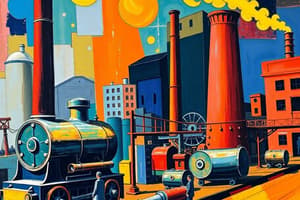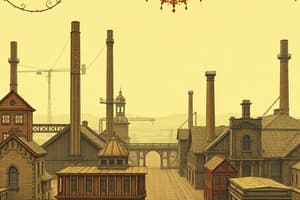Podcast
Questions and Answers
Who invented the cotton gin?
Who invented the cotton gin?
- Eli Whitney (correct)
- Andrew Jackson
- Henry Clay
- Daniel Webster
What is mass production?
What is mass production?
The making of goods in large quantities made possible by factories, machinery, and the division of labor.
Who was Speaker of the House of Representatives from Kentucky who promoted the American System?
Who was Speaker of the House of Representatives from Kentucky who promoted the American System?
Henry Clay
What was the American System?
What was the American System?
What was the National Road?
What was the National Road?
What was the Monroe Doctrine?
What was the Monroe Doctrine?
What was the purpose of the Tariff of 1816?
What was the purpose of the Tariff of 1816?
What was McCulloch v Maryland?
What was McCulloch v Maryland?
Who was the 6th President of the United States?
Who was the 6th President of the United States?
What is nationalism?
What is nationalism?
What was the Adams-Onis Treaty?
What was the Adams-Onis Treaty?
What was the Missouri Compromise?
What was the Missouri Compromise?
Who was Andrew Jackson?
Who was Andrew Jackson?
What was the Democratic-Republican Party?
What was the Democratic-Republican Party?
What is the Spoils System?
What is the Spoils System?
What was the Indian Removal Act?
What was the Indian Removal Act?
What was the Trail of Tears?
What was the Trail of Tears?
Who was John C. Calhoun?
Who was John C. Calhoun?
What was the Tariff of Abominations?
What was the Tariff of Abominations?
Who was Daniel Webster?
Who was Daniel Webster?
Who was Martin Van Buren?
Who was Martin Van Buren?
What was the Bank of the United States?
What was the Bank of the United States?
What was the Whig Party?
What was the Whig Party?
What was the Panic of 1837?
What was the Panic of 1837?
Who was William Henry Harrison?
Who was William Henry Harrison?
What is the Erie Canal?
What is the Erie Canal?
What was the Election of 1824?
What was the Election of 1824?
The term ______ refers to a controversial election that is sometimes referred to as a corrupt bargain.
The term ______ refers to a controversial election that is sometimes referred to as a corrupt bargain.
What was the 2nd Great Awakening?
What was the 2nd Great Awakening?
What is a revival?
What is a revival?
Who was Ralph Waldo Emerson?
Who was Ralph Waldo Emerson?
Who was Charles Finney?
Who was Charles Finney?
What is transcendentalism?
What is transcendentalism?
Flashcards are hidden until you start studying
Study Notes
Key Figures and Concepts
- Eli Whitney: Inventor of the cotton gin and a proponent of interchangeable parts, crucial for manufacturing efficiency.
- Henry Clay: Speaker of the House from Kentucky who advocated for the American System, emphasizing national economic growth.
- John Quincy Adams: 6th President of the United States, part of a controversial election that led to the "corrupt bargain."
Economic Developments
- Mass Production: Enabled by factories and division of labor, allowing goods to be produced in large quantities.
- American System: Economic strategy promoting high tariffs to fund internal improvements, facilitating U.S. industrialization.
- Tariff of 1816: Protective tariff intended to boost American manufacturing industries.
Infrastructure and Expansion
- National Road: First federally funded highway that improved travel and commerce across the nation.
- Erie Canal: Vital water route connecting New York with the Great Lakes, enhancing trade and shipping logistics.
Legal and Political Milestones
- McCulloch v. Maryland: Landmark Supreme Court case affirming federal authority over state laws, denying Maryland's ability to tax the Bank of the United States.
- Monroe Doctrine: U.S. policy established to prevent European interference in the Western Hemisphere.
- Adams-Onis Treaty: Agreement in which the U.S. acquired Florida from Spain, expanding territorial claims.
Social and Political Movements
- Nationalism: The ideology prioritizing national interests over regional differences, fostering unity among states.
- Democratic-Republican Party: Political organization formed by supporters of Andrew Jackson advocating for limited federal power.
Controversial Policies and Events
- Indian Removal Act: Legislation mandating the relocation of Native Americans to territory west of the Mississippi River.
- Trail of Tears: Forced migration path of Cherokee people, resulting in significant loss of life and cultural dislocation.
- Spoils System: Practice of rewarding political supporters with government jobs, leading to corruption and inefficiency.
Economic Crises and Political Changes
- Panic of 1837: Economic recession triggered by multiple bank failures and resulting in widespread financial distress.
- Whig Party: Political group formed in opposition to Andrew Jackson, favoring federal involvement in economic development and infrastructure.
Religious and Cultural Movements
- 2nd Great Awakening: Religious revival movement stressing personal faith and social reform, fostering various reform movements.
- Transcendentalism: Philosophical movement promoting the spiritual and individualistic relationship with nature, led by figures like Ralph Waldo Emerson.
Key Historical Events
- Election of 1824: Controversial election termed as a "corrupt bargain" due to political maneuvering affecting the outcome.
- Tariff of Abominations: Term used to describe the 1828 tariff that raised duties and angered southern states, representing regional economic tensions.
Studying That Suits You
Use AI to generate personalized quizzes and flashcards to suit your learning preferences.




